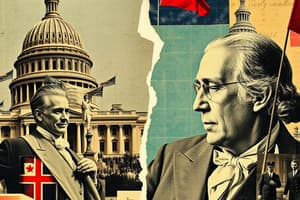Podcast
Questions and Answers
What is the main purpose of high courts in a country?
What is the main purpose of high courts in a country?
- To distribute power among different branches of government
- To make decisions on behalf of the people
- To maintain control through manipulation
- To serve as the final court of appeal (correct)
Which political system empowers the people to choose their own representatives?
Which political system empowers the people to choose their own representatives?
- Meritocracy
- Democracy (correct)
- Monarchy
- Totalitarianism
What distinguishes authoritarianism from democracy?
What distinguishes authoritarianism from democracy?
- Adherence to laws and constitutions
- Centralization of power in the hands of a single leader (correct)
- Empowerment of the people to make decisions
- Maintenance of control through repression and manipulation
In a democracy, how are decisions made on behalf of the people?
In a democracy, how are decisions made on behalf of the people?
What role do high courts play in ensuring justice and law protection?
What role do high courts play in ensuring justice and law protection?
Which political system is characterized by repression and manipulation to maintain control?
Which political system is characterized by repression and manipulation to maintain control?
What is the primary responsibility of high courts?
What is the primary responsibility of high courts?
In authoritarian societies, what challenges do high courts often face?
In authoritarian societies, what challenges do high courts often face?
What role do high courts play in democratic societies?
What role do high courts play in democratic societies?
How do high courts contribute to maintaining the separation of powers?
How do high courts contribute to maintaining the separation of powers?
What principle forms the basis for the relationship between high courts and the three branches of government?
What principle forms the basis for the relationship between high courts and the three branches of government?
What is a key function of high courts in relation to protecting individual rights?
What is a key function of high courts in relation to protecting individual rights?
Flashcards are hidden until you start studying
Study Notes
Political Systems and High Courts: Understanding the Checks and Balances in Action
Throughout history, human societies have devised various political systems to govern themselves, each with its own unique characteristics and mechanisms for checks and balances to prevent abuses of power. As we delve into the intricate world of these systems and their highest judicial institutions, the high courts, we'll explore how they safeguard justice and the law.
Political Systems
Political systems, in essence, are the frameworks by which societies distribute power and make decisions. The two most prominent systems today are democracy and authoritarianism.
-
Democracy is a political system that empowers the people to choose their own representatives, who then make decisions on their behalf within a framework of laws, regulations, and constitutions.
-
Authoritarianism is a political system characterized by the centralization of power in the hands of a single leader, who maintains control through various methods, including repression and manipulation.
Both of these systems have their unique high courts, which play a vital role in ensuring the rule of law and the protection of fundamental rights.
High Courts
High courts are the highest judicial bodies in a country, often serving as the final court of appeal. They are responsible for interpreting and applying the law, ensuring that the decisions of lower courts are consistent with the constitution and other laws, and protecting the rights of individuals and groups.
-
Constitutional courts focus on interpreting the constitution and ensuring that all laws and actions of the government comply with it.
-
Supreme courts are the highest courts in the judicial hierarchy and have the power to review the decisions of lower courts, to ensure that they are consistent with the constitution and other laws.
High courts must fulfill several key functions. First and foremost, they ensure that the government and other authorities adhere to the rule of law by interpreting and applying the law. Second, they protect the rights of individuals and groups by providing a forum for resolving disputes and ensuring that all parties receive a fair hearing. Third, they act as a check and balance on the power of the government by reviewing its actions and decisions to ensure that they comply with the constitution and other laws.
The Interplay of Political Systems and High Courts
The relationship between political systems and high courts is complex and multifaceted. High courts, particularly those in democratic societies, play a critical role in ensuring that governments adhere to the rule of law and protect the rights of individuals. In authoritarian societies, high courts may act as a check on the power of the government, but they often face significant challenges, including government interference, political pressure, and a lack of independence.
In democratic societies, high courts are often considered the guardians of the constitution and the rule of law. They protect the rights of individuals and groups by ensuring that the government adheres to the constitution, by enforcing laws that protect minority rights, and by upholding the independence of the judiciary.
High courts in democratic societies must navigate the complex relationship between the three branches of government: the legislative, executive, and judiciary. This relationship is based on the principle of checks and balances, which ensures that no single branch of government has too much power.
High courts in democratic societies often serve as a check on the power of the executive branch. By reviewing the actions of the government, they ensure that the government adheres to the constitution and other laws. In doing so, they protect the rights of individuals and groups and maintain the separation of powers.
Conclusion
High courts play a vital role in ensuring that governments adhere to the rule of law, protect the rights of individuals, and maintain the separation of powers. They act as a check on the power of the government, ensuring that the government complies with the constitution and other laws. In democratic societies, high courts serve as guardians of the constitution and the rule of law, protecting the rights of individuals and groups. In authoritarian societies, high courts often face significant challenges, including government interference, political pressure, and a lack of independence. As we continue to navigate the complex landscape of political systems and high courts, it is essential that we understand the critical role that high courts play in ensuring justice and the protection of fundamental rights.
Studying That Suits You
Use AI to generate personalized quizzes and flashcards to suit your learning preferences.




